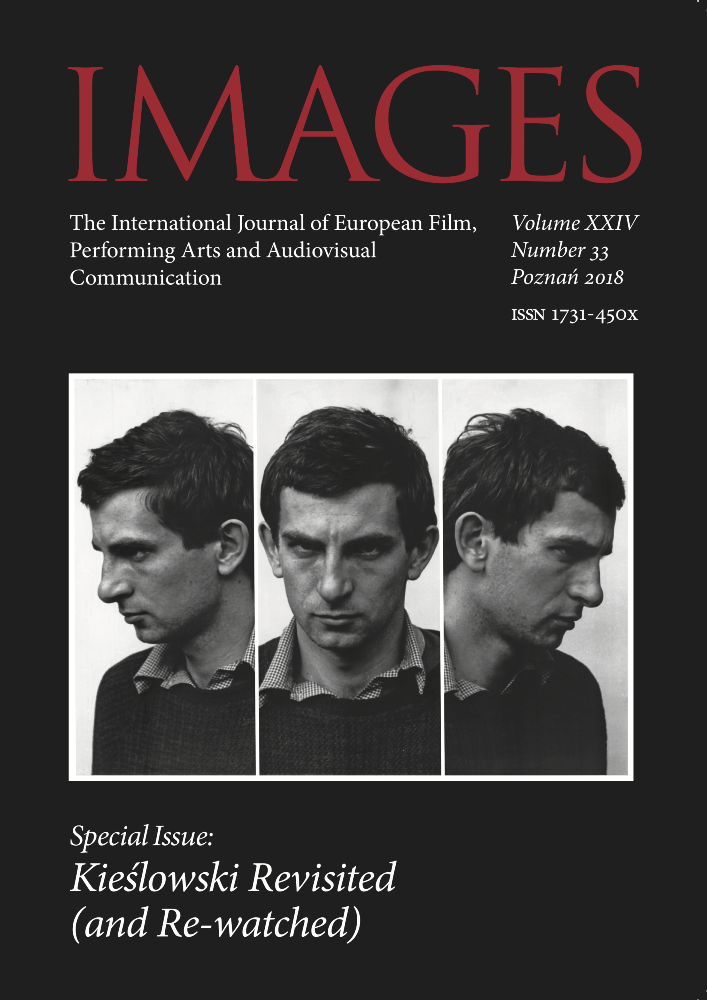Abstract
The computer seems like a privileged personage in Decalogue 1 (Dekalog, jeden, 1987/88, prem. 1989, dir. K. Kieślowski): it is used by Paweł and his father to solve mathematical questions about Miss Piggy, to calculate the durability of the ice on the pond, to know what Mum is doing, and to control domestic devices. For Kieślowski the computer is not just a gadget: Krzysztof ’s lecture describes its potential and its possible autonomy. Independent from man (the computer switches itself on), it becomes his rival: Kieślowski proposes a critical interpretation of the computer as a new idol, promising unlimited memory and knowledge. A similar preoccupation can be found in the Black Mirror series, where new technologies, existing or as yet still fantastic, are becoming more and more intrusive in the lives of their human protagonists. The computer seems also to be a rival of God, present in symbols in Decalogue 1: a sign of him is not only the metaphysical man played by Artur Barciś, but also the biblical symbol of fire and the Madonna’s tears.
References
Berners-Lee T., Three challenges for the web, according to its inventor Sir Tim Berners-Lee. Accessed on 28 February 2018: http://webfoundation.org/2017/03/web-turns-28-letter/
Carr N., The Shallows: What the Internet Is Doing to Our Brains, New York 2010
Czarne lustro. Od wizji mediów do technologii przyszłości, ed. M. Legan, Kraków 2017
Garbowski Ch., Krzysztof Kieślowski’s Decalogue Series. The Problem of the Protagonists and their Self-Transcendence, Lublin 1997
Gold M., “Decalogue One: Witnessing a Responsible Ethics of Response from a Jewish Perspective”, [in:] Of Elephants & Toothaches. Ethics, Politics, and Religion in Krzysztof Kieślowski’s Decalogue, eds. E. Badowska, F. Parmeggiani, New York 2016, pp. 51–79
Kickasola J.G., The Films of Krzysztof Kieślowski. The Liminal Image, New York 2004
Kickasola J.G., “In the Wake of the Bible: Krzysztof Kieślowski and the Residual Divine in Contemporary Life”, [in:] The Bible in Motion. A Handbook of the Bible and Its Reception in Film, Part 1, ed. R. Burnette-Bletsch, Berlin/Boston 2016, p. 675–689
Kieślowski K., Dekalog and other television works, edition: Arrow Films DVD/BluRay, 2016
Kieślowski on Kieślowski, ed. D. Stok, London 1993
Kieślowski K., Piesiewicz K., Dekalog, Warszawa 1996
Klinger M., “Strażnik wrót. Rzecz o Dekalogu Krzysztofa Kieślowskiego”, [in:] Kino Krzysztofa Kieślowskiego, ed. T. Lubelski, Kraków 1997, p. 51–58
Koosed J.L., “The Cinematic Moses”, [in:] The Bible in Motion. A Handbook of the Bible and Its Reception in Film, Part 1, ed. R. Burnette-Bletsch, Berlin/Boston 2016, p. 65–82
, or J. Twenge, iGen. Why Today’s Super-Connected Kids Are Growing Up Less Rebellious, More Tolerant, Less Happy – and Completely Unprepared for Adulthood – and What That Means for the Rest of Us, New York 2017.
Lis M., “Dekalog, osiem – Stary Testament spotyka Ewangelię”, [in:] Kieślowski czyta Dekalog, eds. M. Lis, M. Legan, Opole 2014, pp. 83–91
Lis M., Figury Chrystusa w “Dekalogu” Krzysztofa Kieślowskiego, Opole 2013
Piguet P., “L’icône des outrages (Sur Décalogue I de Kieslowski)”, “Communio. Revue catholique internationale” 1992, no. 1
Spadaro A., Lo sguardo presente. Una lettura teologica di “Breve film sull’amore” di K. Kieslowski, Rimini 1999
Spitzer M., Digitale Demenz: Wie wir uns und unsere Kinder um den Verstand bringen, München 2012
Twenge J., iGen. Why Today’s Super-Connected Kids Are Growing Up Less Rebellious, More Tolerant, Less Happy – and Completely Unprepared for Adulthood – and What That Means for the Rest of Us, New York 2017
Wach M., Krzysztof Kieślowski. Kino der moralischen Unruhe, Köln 2000
License

This work is licensed under a Creative Commons Attribution-NonCommercial-NoDerivatives 4.0 International License.
